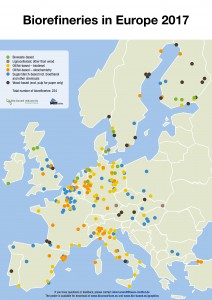The map distinguishes between “Sugar-/starch based biorefineries”, producing bioethanol and other chemicals (63), “Oil-/fat-based biorefineries – biodiesel” (64) and “Oil-/fat-based biorefineries – oleochemistry” (54), “Wood-based biorefineries” (25) excluding those that produce pulp for paper only, “Lignocellulose other than wood” (5) and finally “Biowaste-based biorefineries” (13).
 The prevalence of biorefineries differs considerably between countries. The type of biorefinery is clearly dependent on the locally available biomass. Wood-based biorefineries can be found mainly in Northern Europe and “Sugar-/starch based biorefineries” mainly in France, Belgium, Germany and Hungary, where we see high yields in sugar and starch.
The prevalence of biorefineries differs considerably between countries. The type of biorefinery is clearly dependent on the locally available biomass. Wood-based biorefineries can be found mainly in Northern Europe and “Sugar-/starch based biorefineries” mainly in France, Belgium, Germany and Hungary, where we see high yields in sugar and starch.
To create this map, Cologne-based nova-Institute conducted a comprehensive survey of all European biorefineries in summer 2017. The project was done on behalf of the Bio-based Industries Consortium (BIC).
For this purpose, a large number of sources were evaluated and an online survey was carried out, during which biorefineries could register themselves. Eventually, 224 biorefineries were identified and mapped across Europe.
Several dozens more biorefineries are currently under construction. The map is to be updated annually. If your biorefinery is missing on the map, please contact us: contact@nova-institut.de
The map can be downloaded for free at www.bio-based.eu/graphics or http://bioconsortium.eu
About nova-Institute
nova-Institute is a private and independent institute, founded in 1994; nova offers research and consultancy with a focus on bio-based and CO2-based economy in the fields of feedstock, techno-economic evaluation, markets, sustainability, dissemination, B2B communication and policy. Today, nova-Institute has 25 employees and an annual turnover of more than 2.5 million €. www.nova-institute.eu
About BIC
The Bio-based Industries Consortium (BIC) is a non-profit organisation set up in Brussels in 2012. BIC members cover the entire bio-based value chain and consist of large industries, small and medium-sized enterprises (SMEs), regional clusters and organisations, European trade associations, and European Technology Platforms. BIC represents the private sector in a public-private partnership (PPP) with the EU, represented by the European Commission, known as the Bio-based Industries Joint Undertaking (BBI JU), established in June 2014 as one of the pillars of the European Commission Bioeconomy Strategy. The Bio-based Industries Joint Undertaking is dedicated to transforming renewable, natural resources into innovative bio-based products. www.biconsortium.eu
Download press release as PDF file: 17-11-27 PR Mapping European Biorefineries
Source
nova-Institut GmbH and Bio-based Industries Consortium, press release, 2017-11-27.
Supplier
Bio-based Industries Consortium (BIC)
nova-Institut GmbH
Share
Renewable Carbon News – Daily Newsletter
Subscribe to our daily email newsletter – the world's leading newsletter on renewable materials and chemicals









